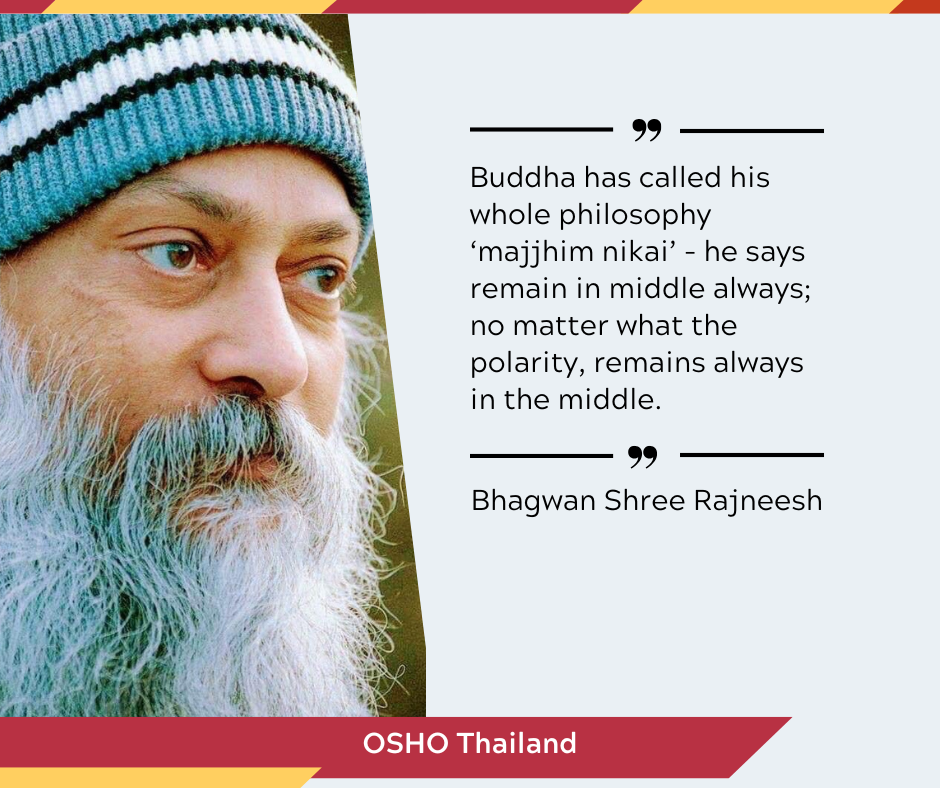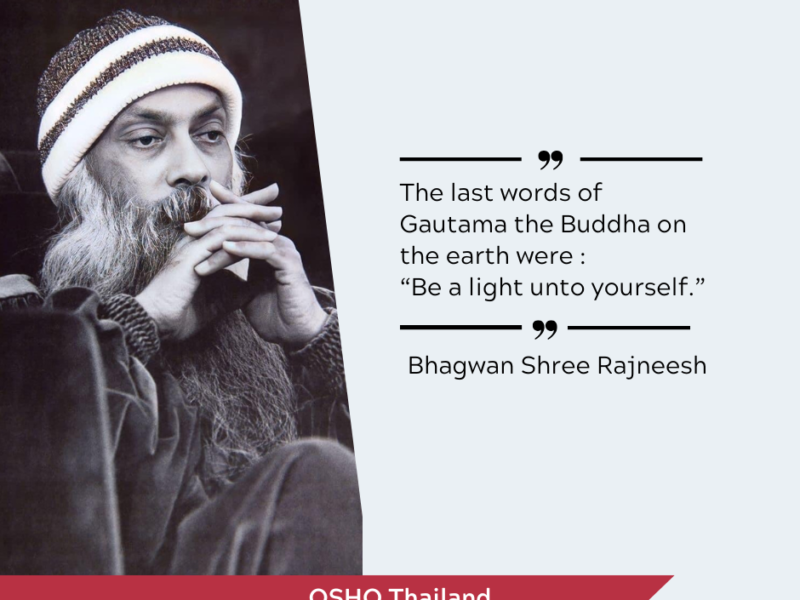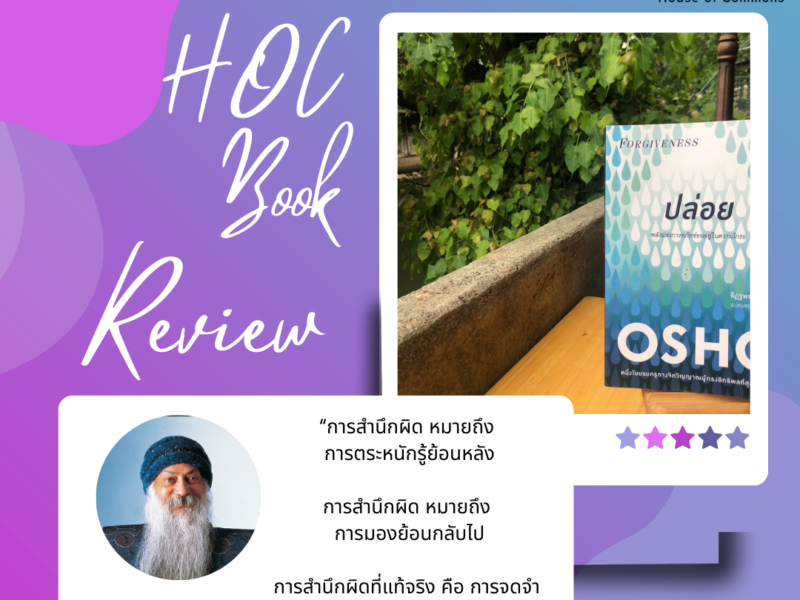(ภาษาไทย กรุณาเลื่อนลงด้านล่าง)
Just sit by the stream of your mind. Don’t do anything; nothing is expected from you. You just keep quiet, calm, as if it none of your business. What is happening in the mind is happening somewhere else. The mind is not you; it is somebody else; you are only a watcher. Buddha has called his whole philosophy ‘majjhim nikai’ – he says remain in the middle always; no matter what the polarity, remain always in the middle. By witnessing one remains in the middle. The moment you lose your witnessing you either become attached or repulsed. If you are repulsed you will go to the other extreme; if you are attached you will try to remain at this extreme, but you will never be in between. Just be a witness. Don’t be attracted, don’t be repulsed. The headache is there; accept it. It is there as a fact. As a tree is there, as the house is there, as the night is there, the headache is there. Accept it and close your eyes. Don’t try to escape from it.
You are happy; accept the fact. Don’t cling to it, and don’t try not to become unhappy. Don’t try anything. If unhappiness comes, allow it. If happiness comes, allow it. Just remain a watcher on the hill, just seeing things. The morning comes, and then evening comes, and then the sun rises, and the the sun sets and there are stars and darkness, and again the sun rises – and you are just a watcher on the hill. You cannot do anything. You simply see. The morning has come; you note the fact, and you know that now the evening will come because the evening follows the morning. And when the evening comes you note the fact, and you know that now the morning will be coming because the morning follows the evening.
When pain is there, you are just a watcher. You know that pain has come, and sooner or later it will go, and the polar opposite will come. And when happiness has come, you know that it is not going to remain always. Unhappiness will be just hidden somewhere, it will be coming. You remain a watcher. If you can watch without attraction and without repulsion you will fall in the middle, and once the pendulum stops in the middle you can look for the first time at what the world is.
While you are moving, you cannot know what the world is; your movement confuses everything. Once you are not moving, you can look at the world. For the first time you know what reality is. A non-moving mind knows what reality is; a moving mind cannot know what reality is. Your mind is just like a camera: you go on moving and taking shots, but whatsoever comes is just a confusion because the camera must not move. If the camera is moving, the pictures are going to be just a confusion.
Your consciousness is moving from one pendulum to another, and whatsoever you know of reality is just a confusion, a nightmare. You don’t know what is what; everything is confused, missed. If you remain in the middle and the pendulum has stopped, if your consciousness is focused now, centered, then you know reality is. Only a mind that is unmoving can know what the truth is.
“Meetings with Remarkable People”
Bhagwan Shree Rajneesh
(OSHO)

เพียงนั่งอยู่ริมลำธารแห่งจิตใจ ไม่ต้องทำสิ่งใด ไม่คาดหมายให้คุณทำสิ่งใด เพียงสงบ นิ่ง ราวกับนั่นไม่เกี่ยวข้องอะไรกับคุณ สิ่งที่กำลังเกิดขึ้นในจิตใจของคุณ คือสิ่งที่เกิดขึ้นที่ไหนสักแห่ง จิตใจนั้นไม่ใช่ของคุณ แต่เป็นของใครบางคน คุณเป็นเพียงผู้เฝ้าดูเท่านั้น พระพุทธเจ้าทรงเรียกปรัชญาทั้งหมดของพระองค์ว่า ‘มัชฌิมนิกาย’ พระองค์ตรัสว่า ให้อยู่บนทางสายกลางเสมอ ไม่ว่าด้านไหนจะเป็นอย่างไร ก็ให้อยู่กับทางสายกลาง ด้วยการเฝ้ามอง เราก็อยู่บนทางสายกลาง ชั่วขณะที่คุณสูญเสียการเฝ้ามอง คุณจะกลายเป็นฝ่ายยึดมั่นหรือไม่ก็ผลักไส หากคุณผลักไส คุณก็จะไปอยู่อีกฟากฝั่งหนึ่งอย่างสุดขั้ว หากคุณยึดมั่น คุณก็จะพยายามอยู่คงที่กับสุดขั้วอีกข้างหนึ่ง ทว่าคุณไม่ได้อยู่ตรงกลาง เพียงเป็นผู้เฝ้ามอง อย่ายึดมั่น อย่าผลักไส ถ้าปวดศีรษะ ก็ยอมรับมันเสีย มันอยู่ตรงนั้น เป็นข้อเท็จจริงเช่นเดียวกับต้นไม้อยู่ตรงนั้น บ้านอยู่ตรงนั้น ค่ำคืนอยู่ตรงนั้น อาการปวดศีรษะก็อยู่ตรงนั้น รับรู้มันแล้วหลับตาลง อย่าพยายามหนีไปจากมัน
หากคุณมีความสุข ก็จงยอมรับข้อเท็จจริงนี้ อย่ายึดติดกับมัน อย่าพยายามทำตัวให้มีความสุข อย่าพยายามใดๆ เลย หากความทุกข์มาเยือน ก็จงปล่อยมัน ถ้าความสุขเกิดขึ้น ก็ปล่อยมัน จงเป็นเพียงผู้เฝ้าดูอยู่บนเนินเขา เพียงมองเห็นสรรพสิ่ง ยามเช้ามาถึง แล้วยามค่ำก็มา จากนั้นพระอาทิตย์ก็ขึ้น แล้วพระอาทิตย์ก็ตก มีดวงดาวและความมืด แล้วพระอาทิตย์ก็ขึ้นอีกครั้ง คุณเป็นเพียงผู้เฝ้ามองอยู่บนเนินเขา คุณไม่อาจทำสิ่งใดได้ เพียงแต่มองเห็น เมื่อยามเช้ามาถึง คุณตระหนักถึงความจริงนี้ แล้วคุณก็รู้ว่า ยามค่ำจะมาถึง เพราะยามค่ำจะตามยามเช้ามา เมื่อยามค่ำมาถึง คุณก็ตระหนักถึงความจริงนี้ แล้วคุณก็รู้อีกว่า อีกเดี๋ยวยามเช้าก็จะมาถึง เพราะยามเช้าเกิดขึ้นตามยามค่ำ
เมื่อความเจ็บปวดอยู่ที่นั่น คุณก็เพียงเป็นผู้เฝ้ามอง คุณรู้ว่าความเจ็บปวดได้เกิดขึ้น และไม่ช้าไม่นานนัก มันก็จะจากไป ขั้วตรงข้ามจะเกิดขึ้นแทน เมื่อเกิดความสุขขึ้น คุณรู้ว่า มันจะไม่ดำรงอยู่ตลอดไป ความทุกข์ซุกซ่อนอยู่ที่ไหนสักแห่ง และมันจะมาเยือน คุณยังคงเป็นผู้เฝ้ามอง หากคุณเฝ้ามองโดยปราศจากการใฝ่หาและผลักไส คุณก็จะอยู่ตรงกลาง เมื่อใดก็ตามที่ลูกตุ้มหยุดอยู่ตรงกลาง คุณก็สามารถมองเห็นสิ่งที่โลกเป็นได้จริงๆ เป็นครั้งแรก
ขณะเคลื่อนที่ คุณไม่อาจรู้ได้ว่าโลกเป็นอย่างไร การเคลื่อนที่ทำให้ทุกสิ่งสับสน มีแต่เมื่อหยุดเคลื่อนที่ คุณจึงจะเห็นโลก เป็นครั้งแรกที่คุณรับรู้ว่าความจริงคืออะไร จิตที่ไม่ขับเคลื่อนนั้นรู้ว่าความจริงคืออะไร จิตที่ขับเคลื่อนไปไม่อาจรับรู้ความจริงได้ จิตของคุณก็เหมือนกล้องถ่ายรูป เมื่อเคลื่อนที่และถ่ายรูป ภาพที่ปรากฏขึ้นล้วนแต่วูปไหวสับสนเพราะกล้องควรจะอยู่นิ่ง หากกล้องเคลื่อนที่ ภาพที่ได้ก็จะเป็นเพียงความสับสน
จิตสำนึกของคุณกำลังเคลื่อนที่จากลูกตุ้มข้างหนึ่งเหวี่ยงไปอีกข้างหนึ่ง ดังนั้น ไม่ว่าอะไรก็ตามที่คุณคิดว่าเป็นความจริง จึงเป็นเพียงความสับสน เป็นฝันร้าย คุณไม่รู้ว่าอะไรคืออะไร ทุกสิ่งล้วนสับสน ผิดพลาด หากคุณยังคงอยู่ตรงกลาง และลูกตุ้มนั้นหยุดนิ่ง หากจิตสำนึกของคุณพุ่งเป้าไปตรงกลาง คุณก็จะรู้ว่าความจริงคืออะไร มีเพียงจิตใจที่ไม่ขับเคลื่อนเท่านั้น ที่จะรู้ว่าความจริงคืออะไร
จากหนังสือ “คุรุวิพากษ์คุรุ – Meetings with Remarkable People”
Bhagwan Shree Rajneesh
(OSHO)
โตมร ศุขปรีชา แปลและเรียบเรียง

